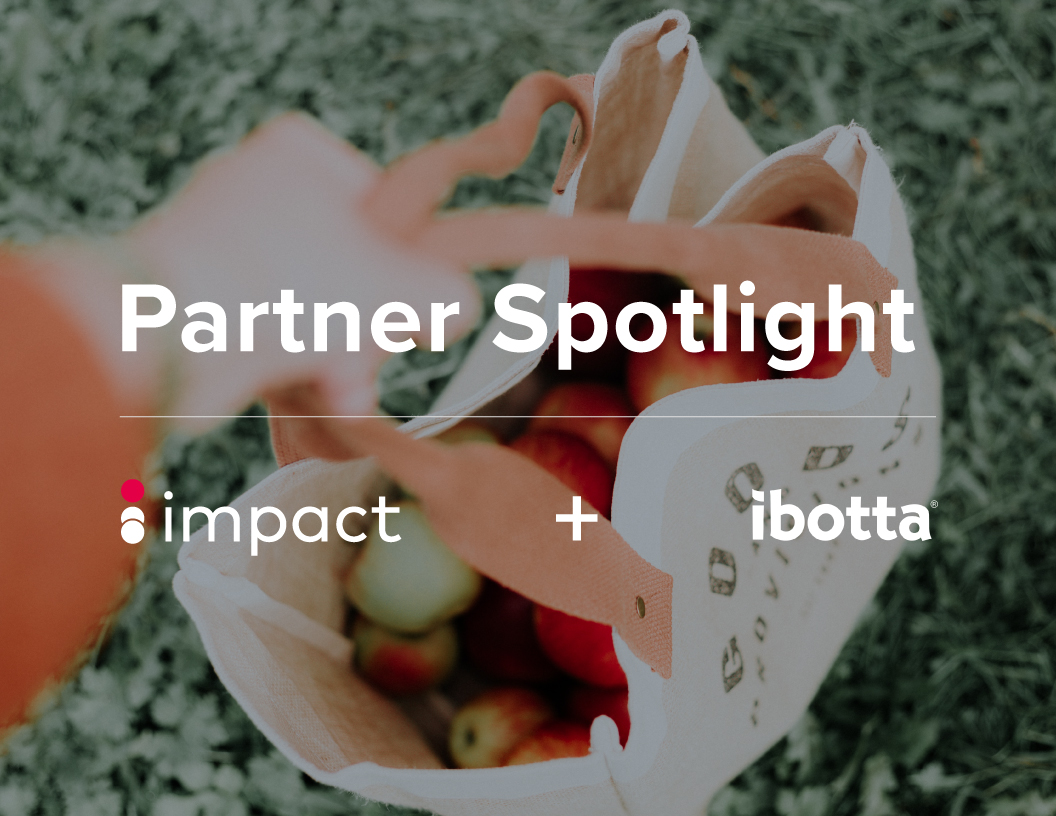Colorado’s Ibotta is a free cashback rewards and payments app that partners with more than 1,500 brands and retailers on desktop and mobile. They’ve paid out more than $860 million in cash rewards to more than 40 million users since their founding in 2012, and they’re known as a leader in “instant” cashback and for offering savings both in-store and online.
We wanted to find out what makes them tick, why they’ve grown so much in the past decade, and where they see the affiliate sector heading next.
Impact’s Richa Dani, Director of Strategic Partnerships, checked in with Chris Dadlani, Director of Business Development at Ibotta for the inside story.
Richa Dani: Especially during the economic slide caused by the pandemic, cashback sites have become increasingly popular with consumers. Make the case for why Ibotta stands out among them for a retailer and for a consumer — what’s unique about Ibotta?
Chris Dadlani: For retailers, Ibotta is one of the most efficient incrementality tools due to our scale (40M users) and the frequency with which users come to our app to inform their purchase decisions. Ibotta users conduct 25-30 sessions/month (almost daily). In fact, we boast 30 percent more daily active users than the next largest mobile loyalty publisher in the space (App Annie’s 2020 annual data).
Traditional retailers benefit from our manufacturer relationships and grocery rewards because it brings users into our app on a frequent basis; content other loyalty publishers simply don’t have. For consumers, Ibotta makes everyday purchases rewarded (in every category imaginable). The app and brand new desktop extension are incredibly easy to use. We have great content and offers. And we provide consumers with cashback instantly, which they can either withdraw to their bank account via PayPal or load onto a partner gift card (also earning cashback on the purchase of that gift card with their earnings).
Richa: How do you work with your brand clients, and what does a typical partnership engagement look like?
Chris: Ibotta works with advertisers on a traditional affiliate CPA basis and flat-fee media spend basis, similar to how advertisers may be working with other loyalty publishers in the space today.
We start an engagement by scheduling an introductory call with Impact representatives (if applicable) and direct advertiser contacts to discuss their goals, KPI’s, key-drive times during the year, opportunities to optimize their existing affiliate, etc. After which we provide a full Ibotta program overview in a consultative nature that ties back to the information they share with us at the top of the call. From there, we’ll collect a signed marketing IO, high-resolution brand logo, lifestyle images & the commission extended within Impact. From there, we’ll design/build the offer & launch it on both our mobile/desktop affiliate platforms to over 40M users. Subsequently, we’ll align on key promotional dates & flight Ibotta specific marketing placements to align with anything the advertiser may be running nationally, such that their brand messaging is consistent across all digital channels.
Richa: Incremental sales are clearly part of the Ibotta value proposition, but so are lower costs. How does your affiliate program reduce costs for retailers?
Chris: Ibotta users come to our app to discover new brands and content, and to inform their purchase decisions. For example, advertisers may see a lot of scale on Facebook, but delivering that type of scale is expensive; Facebook users log on to keep up with their friends and current events. Conversely, Ibotta users come to our platform to shop – their dollars are up for grabs and we can influence where those dollars are spent.
We are capturing consumers with purchase intent, which leads to a great deal of efficiency – conversion rates are very high. We can also use some of our proprietary incrementality tools to boost higher baskets, increase trip frequency, acquire new customers, and optimize bounce-back behavior to ensure we reduce costs and improve spend efficiency.
Richa: You offer retailers a wide array of ad features and promotional upgrades. Can you tell us about some that really seem to perform well for retailers and why?
Chris: In particular, our themed promotional events, which run on a weekly basis, provide great visibility for advertisers by way of the value-add marketing our team deploys in exchange for a modest inclusion fee and increased CPA. Additionally, push notifications, email features/inclusions, social media posts, and home banners are some of my favorite recommendations.
Richa: How do you go about proving incrementality for your desktop affiliate partnerships? Is it harder or easier on the app?
Chris: It’s easier on the app, but that’s because, at one point in time, Ibotta was mobile-first and mobile-only. We launched our desktop product late last year and we’re building incrementality features that mirror some of what we are doing on mobile; think bonuses to drive us AOV/frequency and bounce-back behavior and targeting capabilities to offer differing rewards to different shopper cohorts based on loyalty. We’ll have many of these features fully baked out before the end of the year – luckily, all of these features and more, are already available on mobile today!
Richa: What should retailers know about app-based affiliate marketing that is different from a typical desktop extension?
Chris: The premeditated intent of starting your shopping journey with the app, by default, makes mobile transactions far more incremental than that of those via desktop through a toolbar. For example, extensions that meet consumers in the moment of payment after that shopper has declared intent to transact regardless of receiving an incentive is very inefficient, margin dilutive, and non-incremental. Through Ibotta, we can intercept agnostic or competitive purchasers and steer them toward one advertiser or another.
Richa: There’s a lot going on in the app tracking world, such as the loss of the IDFA in iOS 14.5. What impacts do you foresee, and do you have any tips for folks trying to navigate these changes?
Chris: Ibotta has not seen much of a change – users feel safe and want to provide us their data and device ID, as this creates the most custom and personalized shopping experience for them via our app and desktop products.
Ultimately, if you want customers to feel comfortable providing their data to you, it starts with transparency; providing easy to digest interstitials within your app and desktop environment that not only educates your customers on what data they are providing, but why it behooves them experientially to provide it. Additionally, you’ll want to provide them an easy way to opt-out of providing their data as well if they so choose. At a high level, if you aren’t using customer data to provide a more delightful experience, you’re missing an opportunity to personalize/customize the experience, which will lead to retention and growth issues in the end.
Richa: Ibotta was a trendsetter in getting cashback into consumer pockets quickly; what other benefits are consumers looking for in a cashback program?
Chris: Not only are consumers looking for their cashback quickly, but they are also looking for a quick app and desktop interfaces that are easy to navigate and use. They too, look for personalized experiences and relevant offers that make the discovery of new brands easy and fun. Ibotta deploys numerous weekly surveys to users that help us improve our experiences such that we are bringing the most comprehensive and easy-to-use user experience (UX) to the table.
Richa: Can you tell us about a particularly successful or surprising partnership you’ve developed with a retailer recently? Who are the innovators out there on the retail side?
Chris: I suppose not super surprising given the current climate we live in, but one of our top advertisers on the desktop side of the house so far is an office cleaning supplies company that recently launched. Separately, and as you might expect, Fortune 50 companies continue to scrutinize their affiliate programs and are very smart about how they spend their dollars/how they like to market and use the channel — they are always keeping us on our toes and always innovating!
Richa: What are some best practices that you can share about how you find brand partners to work with and then negotiate contracts?
Chris: Ultimately, advertisers that perform best are going to be those that have a strong product/market fit with our demographic of users. Categories like clothing, health, beauty, home, electronics, grocery/food, kids/baby, pets, etc. all perform well on our platform, which is the criteria we use to identify prospective brands.
As it relates to negotiating contracts, we look at current similar partner performance and their associated incentive structure. This helps us from a competitive standpoint as well as to articulate to newly onboarded brands, or brands considering our platform, that the way they will regain share of wallet/share of voice on our platform is to compete with existing advertisers on both a marketing and CPA basis. This approach creates a level of FOMO among prospective advertisers as they look at what their competitors are doing via our affiliate channel in an effort to recreate their success.
Richa: Is there a type of business you can see benefitting from the cashback model that currently isn’t represented there? How about a particular brand you’d love to see on your roster?
Chris: Whole Foods would do tremendously well in the online affiliate space and in particular on Ibotta’s platform given our history in the CPG space and audience overlap. As it relates to a specific category, I think private-label brands would benefit tremendously from affiliate and from cashback, specifically because they have a larger margin to play with than name-brand goods. Accordingly, private-label would be able to offer a stronger cash back incentive, which would help with incrementality. They’d be able to conquest competitive shoppers, acquire agnostic shoppers, and drive higher purchase frequency amongst existing by offering some sort of incentive aside from just a lower base price (which is usually the case).
Richa: What are some trends you predict for the affiliate industry in the months ahead?
Chris: I predict that there will be a focus on SKU-level or item-level cashback incentives for high-margin goods. I continue to think that dollars will need to be spent efficiently and cashback on high-margin goods is a great way to ensure advertiser profits are at a premium.
Richa: Thanks so much for sharing your insights, Chris! It’s been great to get your take on the ever-changing and ever-growing cashback and affiliate world.
Like what you learned? If you want to work with great partners like Ibotta, reach out to a growth technologist at grow@impact.com.




